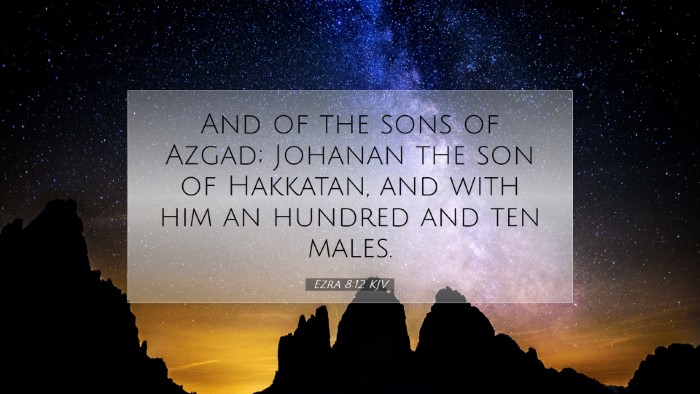Commentary on Ezra 8:12
Verse Context: Ezra 8:12 states, "Of the sons of Ahab, Johanan the son of Hakkatan, and with him were a hundred and ten males."
General Overview
The verse presents a straightforward census of those who accompanied Ezra on his return to Jerusalem from Babylon. It highlights the participation of specific families and individuals in a significant religious and social undertaking—the restoration of the Jewish community after the Babylonian exile. The counting of individuals is not merely statistical; it serves the dual purpose of affirming communal identity and establishing leadership.
Commentary Insights
Matthew Henry’s Commentary
Emphasis on Leadership: Matthew Henry underscores the importance of leadership within the returnees. Johanan, the son of Hakkatan, is presented as a leader among the sons of Ahab. Henry points out that the mention of leaders and notable figures in the return to Jerusalem demonstrates the significance placed upon restoring proper worship and governance.
Identity and Inclusion: Henry also notes that the act of listing individuals serves to establish a collective identity. The returnees were not merely a mass of people; they were a community with familial ties, indicating the importance of family and heritage in communal life. This reinforces the idea that spiritual journeys are often undertaken in community.
Albert Barnes’ Notes on the Bible
Cultural Context: Barnes highlights the cultural significance of family lineage in ancient Israel. The listing of individuals by their paternal connection reflects the patriarchal structure within the society. This thorough accounting emphasizes not only individual participation but also the broader social fabric that each person represents.
Restoration Narrative: Barnes connects the census to the overarching narrative of restoration following exile. By detailing who returned, the author of Ezra affirms God's faithfulness in bringing a remnant back to their homeland, fulfilling prophetic promises. This context is crucial for understanding the theological implications of the return as a divine act of restoration.
Adam Clarke’s Commentary
Spiritual Implications: Adam Clarke reflects on the spiritual implications of the census. Each male named is part of the remnant, which denotes hope and the fulfillment of God's promises to His people. Clarke emphasizes that the return was not solely a physical journey but also a spiritual pilgrimage, with each individual contributing to the restoration of proper worship practices.
Symbolism of Numbers: Clarke often pays attention to the symbolism of numbers in Scripture. The total of one hundred and ten males may not seem significant at first glance, but Clarke suggests that such numbers often bear deeper meanings, potentially representing completeness or a specific divine plan in the broader scope of Israel's history.
Theological Reflections
The theological implications of Ezra 8:12 extend beyond the historical record. The listing of individuals in the context of divine restoration speaks volumes about God's involvement in the lives of His people. As pastors and theologians reflect on this verse, they might consider the following aspects:
- Communal Identity: The verse reminds believers that faith is a communal journey. Each person's participation matters, and the collective identity strengthens the body of Christ.
- God's Faithfulness: The act of returning to the homeland can be seen as a testament to God's faithfulness in fulfilling His promises, which can encourage believers in their own faith journeys.
- Leadership in Community: The mention of leaders like Johanan prompts reflection on the nature of leadership within the church. Leaders are called to guide, protect, and nurture the community as it seeks to worship God faithfully.
- Heritage and Legacy: The family connections documented in the verse encourage the consideration of spiritual heritage and the responsibilities that come with it. Each generation is tasked with passing down faith and cultivating a right relationship with God.
Application for Today’s Believers
In applying the lessons from Ezra 8:12, believers today may reflect on their connections within the church community. The journey of faith is not undertaken alone; it involves relationships, accountability, and mutual encouragement. One practical application could be:
- Engaging in Community: Seek opportunities to engage with others in faith. This could take the form of small groups, mentorship, or service projects where spiritual heritage and collective identity can be shared and strengthened.
- Recognizing Leadership: Acknowledge and support leaders within the church who, like Johanan, play pivotal roles in guiding the community in its mission and worship.
- Celebrating God's Faithfulness: Regular remembrance of God's faithfulness in personal lives and the life of the church fosters a culture of gratitude and reliance on Him.
Conclusion
Ezra 8:12 serves as a vital verse in the narrative of Israel’s return from exile. By examining the comments from traditional commentaries, we discover a rich tapestry of insights that challenge and inspire contemporary believers. Through understanding the historical context and spiritual significance of each name that appears in this census, the church can appreciate its own story as a community called to worship, restore, and fulfill the Great Commission in a world eager for reconciliation.


